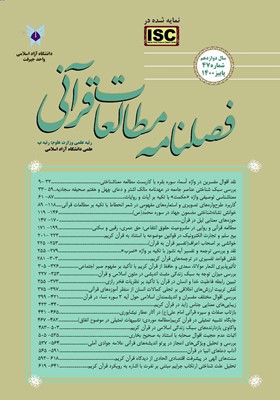تبیین رابطه فاعلیت خدا و انسان در قرآن با تأکید بر نظریات فخر رازی
محورهای موضوعی : فصلنامه مطالعات قرآنیرضا کهساری 1 * , محمدرضا عامریان 2 , علیرضا صابریان 3
1 - استادیار، دکتری تخصصی الهیات و فلسفه و کلام سمنان، دانشگاه آزاد اسلامی، سمنان، ایران
2 - دانشجوی دکتری الهیات، علوم قرآن و حدیث، واحد سمنان، دانشگاه ازاد اسلامی، سمنان، ایران
3 - استادیار، دکتری تخصصی علوم و قرآن حدیث، سمنان، دانشگاه آزاد اسلامی، سمنان، ایران
کلید واژه:
چکیده مقاله :
نقش انسان در افعال خود از مباحث مهم کلامی و تفسیری است، بدین معنا که آیا انسان در افعال خود قدرت انتخاب دارد و یا اینکه مجبور اراده الهی است و اراده او در انجام افعال نقشی ندارد؟ فخر رازی، فیلسوف، متکلم و مفسر بزرگ قرن ششم و هفتم، افعال انسان را مخلوق خدا دانسته و معتقد است که انسان در انجام افعال خود هیچ اختیاری از خود نداشته، و اراده و اختیار انسان را منافی با توحید در خالقیت و ربوبیت میداند. وی علم ازلی و گستره الهی را موجب جبری بودن افعال میداند و بیان میکند همانگونه که خدا، خالق انسان است، آفریدگار افعال او نیز میباشد. نگارنده به روش توصیفی تحلیلی، به کنکاش آرای فخر پرداخته و نظریه وی را متعارض با آیات قرآن و اصل علیت میداند. از دیگر نتایج این پژوهش، رابطه عرضی خالقیت خدا و انسان و تبیین رابطه ثبت اعمال انسان در امالکتاب با جبری بودن انسان، میتوان اشاره کرد.
The role of man in his actions is one of the important theological and interpretive issues, that is, does man have the power of choice in his actions or is he forced by the divine will and his will has no role in performing actions? Fakhr Razi, a great philosopher, theologian and commentator of the sixth and seventh centuries, considers human actions as God's creation and believes that man has no authority in performing his actions, and considers man's will and authority to be contrary to monotheism in creation and lordship. He considers the eternal knowledge and divine scope as the cause of the coerciveness of actions and states that just as God is the creator of man, so he is the creator of his actions. In a descriptive-analytical method, the author explores the views of Fakhr and considers his theory to be in conflict with the verses of the Qur'an and the principle of causality. Other results of this research include the cross-sectional relationship between the creation of God and man and the explanation of the relationship between the recording of human deeds in Ommolketab and the coercion of human beings.
کتابنامه
قرآنکریم، ترجمه آیتالله مکارم شیرازی.
جوادی آملی، عبدالله. 1392ش، تفسیر تسنیم، چاپ چهارم، قم: اسراء.
حلی، جمالالدین حسن بن یوسف. 1373ش، کشف المراد فی شرح تجرید الاعتقاد، شرح علی محمدی، چاپ سوم، قم: دار الفکر.
حلی، جمالالدین حسن بن یوسف. 1376ش، باب حادی عشر، شرح حسن مصطفوی، چاپ دوم، تهران: امیرکبیر.
رازی، فخر. 1378ش، تفسیر کبیر، ترجمه علیاصغر حلبی، چاپ اول، تهران: اساطیر.
رازی، فخر. 1407ق، المطالب العالیة من العلم الإلهی، تصحیح سقا احمد حجازی، بیروت: دار الکتاب.
رازی، فخر. 1414ق، القضاء والقدر، تصحیح محمد معتصم بالله بغدادی، چاپ دوم، بیروت: دار الکتاب العربی.
رازی، فخر. 1420ق، التفسیر الکبیر، چاپ دوم، بیروت: دار احیاء التراث العربی.
رازی، فخر. ۱۹۸۴م، محصل أفکار المتقدمین والمتأخرین من العلماء والحکماء والمتکلمین، تقدیم وتعلیق عبد الرؤوف سعد، بیروت: دار الکتاب العربی.
رازی، فخر. 1992م، اسرار التنزیل وأنوار التأویل، تحقیق احمد حجازی السقا، چاپ اول، بیروت: دار الجیل.
سبحانی، جعفر. 1368ش، جبر و اختیار، تحقیق علی ربانیگلپایگانی، چاپ اول، قم: مؤسسه تحقیقاتی سید الشهداء.
طباطبایی، محمدحسین. 1387ش، نهایت فلسفه: ترجمه نهایة الحکمة، ترجمه مهدی تدین، به کوشش هادی خسروشاهی، قم: بوستان کتاب قم(انتشارات دفتر تبلیغات اسلامی حوزه علمیه قم).
مصباح یزدی، محمدتقی. 1368ش، معارف قرآن، چاپ دوم، قم: مؤسسه در راه حق.
مقالات
سبحانی، جعفر. 1369ش، «جبر و اختیار از دیدگاه وحی و خرد»، شماره 11(مسلسل 47)، تهران: کیهان فرهنگی.
_||_The Holy Quran, translated by Ayatollah Makarem Shirazi.
Javadiya Amoli, Abdullah 2013, Tafsir Tasnim, fourth edition, Qom: Esra '.
Hali, Jamaluddin Hassan bin Yusuf. 1994, Kashf al-Murad fi Sharh Tajrid al-A'tiqad, Sharh Ali Mohammadi, third edition, Qom: Dar al-Fikr.
Hali, Jamaluddin Hassan bin Yusuf. 1997, Bab Hadi Ashar, discribtion by Hasna Mostafavi, second edition, Tehran: Amirkabir.
Razi, Fakhr. 1999, Tafsir Kabir, translated by Ali Asghar Halabi, first edition, Tehran: Asatir.
Razi, Fakhr. 1407 AH, the highest content of the divine knowledge, corrected by Saqa Ahmad Hejazi, Beirut: Dar al-Kitab.
Razi, Fakhr. 1414 AH, Al-Qaza 'al-Qadr, edited by Muhammad Mutasim al-Baghdadi, second edition, Beirut: Dar al-Kitab al-Arabi.
Razi, Fakhr. 1420 AH, Al-Tafsir Al-Kabir, second edition, Beirut: Dar Al-Ahya Al-Tarath Al-Arabi.
Razi, Fakhr. 1984, Student of the Thoughts of the Early and the Latest Scholars and the Wise and the Theologians, Presented and Commented by Abdul Rauf Saad, Beirut: Dar Al-Kitab Al-Arabi.
Razi, Fakhr. 1992, Asrar Al-Tavil and Anvar Al-Tavil, by Ahmad Hejazi Al-Saqqa, First Edition, Beirut: Dar Al-Jail.
Sobhani, Jafar 1989, Force and Authority, Research on Rabbani Golpayegani, First Edition, Qom: Seyyed Al-Shohada Research Institute.
Tabatabai, Mohammad Hussein 2008, The End of Philosophy: Translation of the End of Wisdom, translated by Mehdi Tadayon, by Hadi Khosroshahi, Qom: Bustan Ketab Qom (Qom Seminary Islamic Propaganda Office Publications).
Mesbah Yazdi, Mohammad Taqi 1989, Maaref Quran, second edition, Qom: Institute of Dar Rahe Hagh.
Articles
Sobhani, Jafar 1990, "Force and Authority from the Perspective of Revelation and Wisdom", No. 11 (Series 47), Tehran: Kayhan Farhangi.

